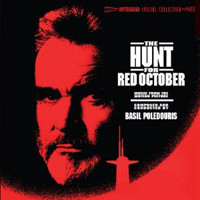- Composed by Basil Poledouris
- Intrada / 2013 / 70m
At the peak of his powers, Tom Clancy was the most popular novelist in the world, his hero Jack Ryan fighting the embers of the Soviet Union towards the end of the Cold War and then the powers that emerged afterwards. The Hunt for Red October was the first movie adaptation of one of his books and saw Ryan negotiating the defection of a Russian submarine captain and his crew. The film would prove to be the most successful scored by Basil Poledouris and is one of his most popular scores. The centrepiece is the fantastic “Hymn to Red October”, a Prokofiev-like stirring chorale that stiffens all the sinews. It’s a fabulous piece, really, bold and striking and amongst the most memorable things the beloved composer ever wrote. Highlights elsewhere include “Ancestral Aid” which is a brilliantly murky suspense cue encompassing more choir and subtle electronics; the terrific brief action cue “Plane Crash”; just a dash of romance in “Two Wives”; “Chopper” recovers from an unfortunate electronic start to turn into a riveting piece of action/suspense; and of the two lengthy action centrepieces, “Nuclear Scam” is terrific but “Kaboom!” is blighted by the cheap sound of the electronics spoiling what would otherwise be a great action finale.
The eagle-eyed might notice that literally all the cues I named above are to be found on the much-pilloried original MCA half-hour soundtrack album. So what of the rest of the score… well, I shall whisper it quietly, but it doesn’t really do anything for me. Much of it is pieced together from much shorter cues, lending it a very bitty feel that doesn’t ever allow much musical flow; electronics are regularly plastered over the orchestra and they’re horribly tinny 80s-era electronics that do not make pleasant listening (a problem which afflicted some of the original album too, to be frank); and dare I say there’s even a feeling of Mickey Mousing about some of the action music which is hard to take seriously. Get the Intrada album for the improved sound, sure (and Scott Bettencourt’s enjoyable liner notes) – but if you want a decent listening experience, immediately dump all the previously-unreleased tracks and resequence the rest so you reproduce the old MCA album.
Rating: *** (** for the album as presented, **** for the one you can easily make from it but probably already owned)
facebook.com/moviewave | twitter.com/MovieWaveDotNet | amazon.com












I had the same reaction when I listened to it. Maybe the problem is that I had very high expectations – if anything, Intrada usually excels at creating satisfying listening experiences. Robocop, for instance, even featuring almost the same music that the previous Varese release was a great improvement. Here I kept waiting for the new music to wow me and it never happened.
Maybe because of this the new release of The Abyss has really surprised me – I wasn’t expecting it to have any new interesting music. Especially the bonus tracks, which I find very enjoyable. Shame about the sequencing though.
Here’s a thought…I don’t think that the sound quality is all that much better on this new release.
Didn’t the liner notes say something about Poledouris getting his budget hacked while he was in the process of writing the score? His original plan was to transition from the amazing Prokofiev-ian anthem to some kind of equally-grand Copland-esque American equivalent at the end. I can’t imagine how that would work, but I’m not Basil Poledouris at his prime. Apparently (someone correct me if I’m remembering it wrong) Poledouris had to reconceptualize his approach on the fly and come up with some kind of methodology for the second half of the score that would make the orchestral-to-electronic transition ‘okay’ – and maybe he didn’t entirely succeed.. I’m not saying any of this makes the music in the film any less electronic-sounding or more memorable, but mitigating circumstances do explain what’s there. After all, there should be no question that with the shackles removed, Poledouris could deliver the goods like few others. It’s small wonder he went off film scoring a bit after “Hunt for Red October”.
And just to be contrary – I think the sound quality is much improved, but it doesn’t do the thin electronic stuff too many favors. I’m glad to have it, though.
I listened to this album one month after being presented to the amazing Conan the Barbarian, my first contact with Basil Poledouris’ music. However, I was a bit disappointed. The excellent cue “Chopper” starts a fantastic sequence of incredibly tense cues that could have a bombastic finale in “Kaboom!”, but this track is nothing but weird 80’s synthesizers, along with the percussion that worked so well on the previous tracks, but here they’re only boring.
And I have a question for you guys: Jerry Goldsmith or Basil Poledouris? Who was the king of the action “macho man” scores of the 80’s and 90’s?
Tiago, that’s a difficult question. Goldsmith definitely had more, but with what few that Poledouris had, those were pretty solid. I enjoy both, but I’ll go with Goldsmith.
Impossible to choose. As Alonso said, Jerry wins on quantity. However, I’d argue that Basil was just as good at that kind of score as Jerry was, with as strong and unique a voice.
I choose Harold Faltermeyer – he is the obvious winner.
Always a favourite here at Movie Wave, Faltermeyer.